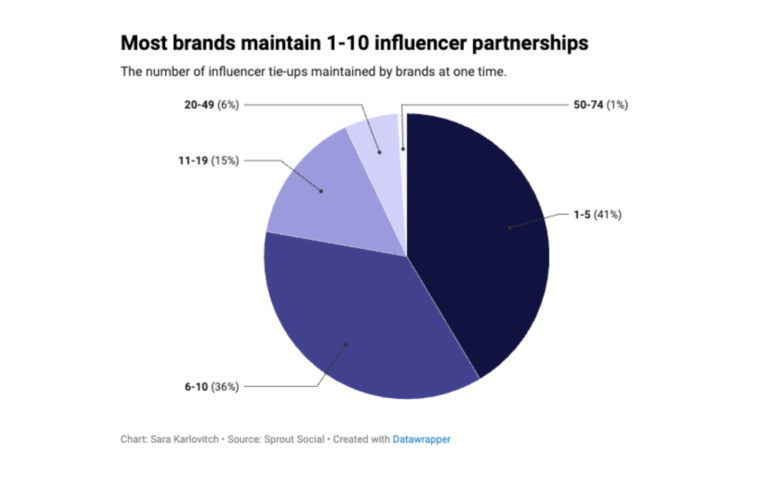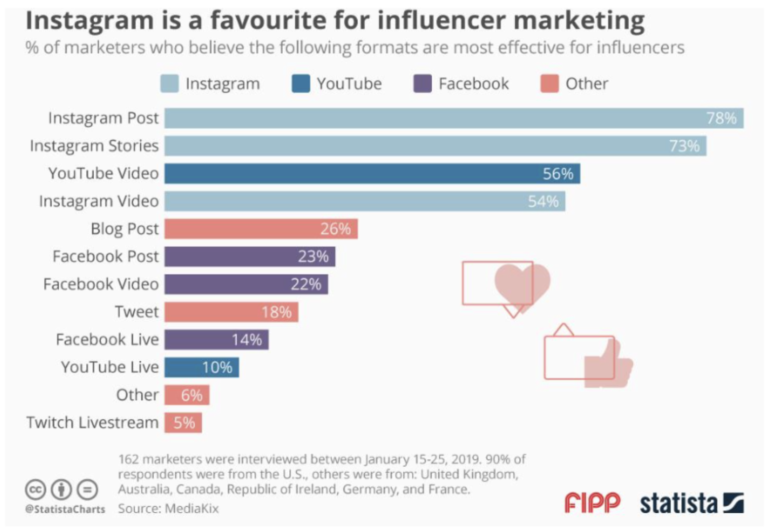Why Influencer Marketing Still Matters in 2025
Influencer marketing is no longer a buzzword, it’s a strategic growth engine. In 2025, global spending on influencer campaigns hit $32.55 billion, with brands increasingly treating creators as long-term partners rather than one-off content producers. The UK, in particular, remains a hotbed for influencer activity. With a mature market, advanced tech adoption, and a thriving creator economy, UK influencer marketing is not just growing, it’s evolving.
The UK: Europe’s Influencer Powerhouse
The UK influencer marketing industry is the most mature in Europe, with ad spend expected to hit £930 million in 2024 and forecast to reach £1.3 billion by 2029. This is more than double France’s 2024 influencer ad spend and significantly ahead of Germany’s. UK brands benefit from access to over 98,000 Instagram creators with 5,000+ followers and a massive 633,000+ accounts with 1,000+ followers, far outpacing similar markets.
This dense pool of creators gives UK brands a unique opportunity to connect with micro and nano influencers, who consistently deliver stronger engagement and better cost-efficiency.
Why Brands Are Increasing Influencer Budgets
Marketers are doubling down on influencer marketing in 2025. According to Sprout Social’s Q1 Pulse Survey, 59% of marketers plan to partner with more influencers than in 2024, while only 4% intend to cut back.
Seventy-seven percent of brands partner with 1–10 influencers at any time. B2C brands tend to engage in a higher volume of influencer partnerships compared to the average, with 52% of consumer-facing brands partnering with 6–10 influencers, and 23% working with 11–19.

The reasons for this growing investment are varied:
-
66% of brands say their goal is to increase brand awareness
-
59% cite improved audience engagement
-
55% report increased credibility, trust, and revenue growth
-
45% aim to boost customer loyalty and retention
-
33% focus on product development and co-creation
Performance, Not Popularity: ROI Takes Centre Stage
In 2025, the shift away from vanity metrics is accelerating. More brands now focus on performance metrics such as engagement, conversions, and content quality, rather than follower counts alone. According to Later’s 2025 report, 73% of brands prefer micro and mid-tier creators, who offer the best engagement-to-cost ratios.
Nano-influencers now charge between £50 and £200 per post, and micro-influencers can earn £200 to £1,000, depending on their niche and audience engagement. Brands are also experimenting with commission-based payments, with up to 25% of UK influencer campaigns incorporating performance-linked fees.
Authenticity Builds Trust and Drives Results
Influencer marketing works best when it’s built on authenticity and shared values. According to Sprout Social data, 64% of consumers are more likely to purchase from a brand endorsed by an influencer they like and that figure climbs to 76% for Gen Z and 74% for Millennials.
By partnering with trusted creators who speak directly to their communities, brands can build long-term loyalty and consistent conversions. This is especially critical in a world where social platforms increasingly serve as search engines for discovery and purchase.
Integrated Campaigns Are the New Standard
Gone are the days of standalone influencer posts. UK brands are now integrating influencer content across multi-platform campaigns, from TikTok and Instagram to YouTube and Pinterest. Creators help shape strategy, not just content, bringing valuable insight into what resonates with their audience.

These integrated campaigns combine awareness with conversion and give brands measurable results across the full funnel.
AI Tools and Data Are Transforming the Landscape
With the sheer volume of creators and platforms available, AI is essential for discovery, campaign planning, and performance tracking. Tools like Kolsquare use AI to match brands with creators, automate reporting, and predict ROI. Brands can now identify high-performing creators, monitor social sentiment, and optimise campaigns with unprecedented speed and precision.
The result is more strategic execution, stronger ROI, and fewer wasted ad pounds.
Final Thoughts: Influencer Marketing Is Essential, Not Optional
The influencer marketing landscape in the UK and beyond is evolving but its value is clearer than ever. Backed by growing ad spend, AI-powered insights, and a deep talent pool, influencer marketing now delivers measurable business results, not just reach.
Brands that integrate creator partnerships into their broader strategies will see the greatest return. Whether you’re launching a product, boosting sales, or building community, influencer marketing remains one of the most cost-effective, authentic, and scalable marketing strategies available in 2025.


Leave a Reply